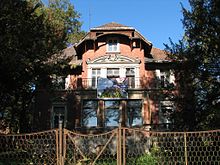Dahlwitz-Hoppegarten
|
Dahlwitz-Hoppegarten
Hoppegarten municipality
|
|
|---|---|
| Coordinates: 52 ° 30 ′ 16 ″ N , 13 ° 39 ′ 0 ″ E | |
| Height : | 46 m above sea level NHN |
| Incorporation : | October 26, 2003 |
| Postal code : | 15366 |
| Area code : | 03342 |
Dahlwitz-Hoppegarten is a formerly independent municipality in the Märkisch-Oderland district ( Brandenburg ). 1928 the inclusion of the name component of the former Vorwerk Hoppegarten in the community name of Dahlwitz. On October 26, 2003 it was merged with the communities of Hönow and Münchehofe to form the new community of Hoppegarten .
Dahlwitz-Hoppegarten has about 6,000 inhabitants.
geography
Dahlwitz-Hoppegarten is east of the Berlin district of Marzahn-Hellersdorf ( Mahlsdorf district ). To the north and east of the town is Neuenhagen , to the south the town of Münchehofe, which also belongs to the municipality of Hoppegarten.
Several ditches run through Dahlwitz-Hoppegarten, including the Zochegraben , the Wernergraben or the Neuenhagener Mühlenfließ , all of which flow into the Spree .
history
The place Dahlwitz is first mentioned in a document in 1370 with the name "Dolewitz", but it is assumed that its origins in the 12th / 13th centuries. Century lie. The name Dahlwitz is derived from the Slavic words dol or dal for 'long' and witz for 'place' or 'village'. The Angerdorf was on a north-south axis that led from Stettin to Köpenick .
The ownership of the place Dahlwitz changed frequently over the centuries since the Middle Ages ; so in 1716 Carl Hildebrand sold Baron von Canstein Dahlwitz to the Privy Councilor Baron Samuel von Marschall . A street near the village church is named after von Canstein.
In 1855/56 the castle-like manor Dahlwitz was built by the architect Friedrich Hitzig on behalf of Carl Heinrich von Treskow . The castle is located in a park built by Peter Joseph Lenné and named after him and was extensively restored and renovated in 2011.
The racetrack was established in 1867 and subsequently attracted new settlers from Berlin, who built imposing villas, some with stables, especially in today's Goetheallee, Lindenallee and Rennbahnallee.
In November 1945 six young people (one 15, the other 16 years old) were arrested by the Soviet secret service NKVD in Hoppegarten . Two of them were shot dead in July 1946 on " werewolf " charges, and the other four were given ten years' labor camp. One of them died in 1948 in the Sachsenhausen special camp . In 1998 the entire group was rehabilitated by the Prosecutor General of Russia.
Population development
|
|
|
Territory of the respective year
Infrastructure
Road traffic
The B 1 / B 5 federal highways run through Dahlwitz-Hoppegarten . The Berlin-Hellersdorf junction on the A 10 motorway (eastern Berlin ring) is around eight kilometers away.
Rail transport
Next to the Hoppegarten (Mark) train station, there is also the Birkenstein stop in the municipality of Dahlwitz-Hoppegarten . It is located on the line kilometer 14.9 of the Berlin – Küstrin-Kietz border line . The stop has a central platform with two platform tracks. In daytime traffic it is served every 10 minutes by the S5 S-Bahn line of the Berlin S-Bahn . Although there were plans for a station between Mahlsdorf and Hoppegarten as early as 1941, the stop was not put into operation until December 21, 1992. As one of 20 so-called main stations of the Berlin S-Bahn, the station is manned by local supervision.
economy
In 2015, the new European headquarters of CLINTON Großhandels-GmbH with the menswear label CAMP DAVID and the womenswear label SOCCX opened in Dahlwitz-Hoppegarten on Neuer Hönower Weg . The inauguration took place here with celebrities from sports and show business.
Attractions
- traditional horse racing track Hoppegarten
- former winter quarters of the GDR state circus
- Protestant village church Dahlwitz, field stone church from the Middle Ages, rebuilt in Baroque style from 1723 to 1733
- Manor house ("Castle") in Rudolf-Breitscheid-Strasse with Lenné park
- Historic villas in Rennbahnallee, Goetheallee and Lindenallee
literature
- Historical guide, sites and monuments of history in the districts of Potsdam, Frankfurt (Oder), Urania Verlag Leipzig-Jena-Berlin, 1st edition 1987
-
Paul Grossmann :
- Local history about Dahlwitz-Hoppegarten , arr. and ed. by Paul Großmann, Berlin-Mahlsdorf, Fritz-Reuter-Straße 6: self-published by the publisher, [15 deliveries in the period from 1931 to 1934]
- from it: Die Frankfurter Chaussee (Berlin-Frankfurt on the Oder) , Berlin-Mahlsdorf, Fritz-Reuter-Straße 6: self-published, 1933
- Kiekemal. The emergence and decay of a colony from the Frederician era , edited and edited. by Paul Großmann, Berlin-Mahlsdorf, Fritz-Reuter-Straße 6: self-published, 1934
Individual evidence
- ↑ Municipalities in 1994 and their changes since January 1st, 1948 in the new federal states. Metzler-Poeschel publishing house, Stuttgart 1995, ISBN 3-8246-0321-7 , publisher: Federal Statistical Office
- ↑ Zochegraben, Hoppegarten. Accessed July 22, 2020 (waters).
- ↑ Wernergraben, Dahlwitz-Hoppegarten, Erpetal, E11. Accessed July 22, 2020 (waters).
- ↑ European Water Framework Directive / State of Berlin. Accessed on July 22, 2020 : "The Erpe or - as it is called above Hoppegarten - the Neuenhagener Mühlenfließ winds its way through Brandenburg and Berlin for 31 km."
- ↑ http://www.gemeinde-hoppegarten.de/verzeichnis/objekt.php?mandat=54849
- ↑ Benno Prieß: Shot at dawn . Self-published, co-publisher: State commissioner for the documents of the State Security Service of the GDR. Calw 2002, ISBN 3-926802-36-7 . Pp. 224-232
- ^ Historical municipality register of the state of Brandenburg 1875 to 2005. Landkreis Märkisch-Oderland . Pp. 22-25
- ↑ Jürgen Meyer-Kronthaler, Wolfgang Kramer: Berlin's S-Bahnhöfe / A three-quarter century . be.bra verlag, Berlin 1998. ISBN 3-930863-25-1 , p. 38.
- ↑ Printed matter 17/15669. (PDF) Berlin House of Representatives, March 19, 2015, accessed on July 11, 2015 .
- ↑ Opening of the CLINTON European headquarters in Dahlwitz-Hoppegarten near Berlin TrendJam Magazin, accessed on July 13, 2015




